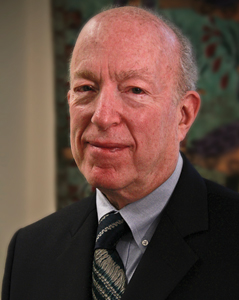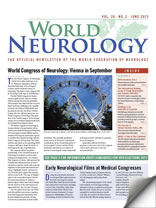
Donald H. Silberberg
How can we help individuals with neurological problems obtain the best possible care in every country? The World Federation of Neurology, representing about 27,000 neurologists from 113 countries, plays a potentially critical role in this effort. Through its officers, 15 committees and over 20 working groups, the WFN seeks to educate, advocate and support research and clinical care in many parts of the world. A particular focus is to bring improved services to areas that are under-resourced.
A major function of the World Congress of Neurology, which is held every other year, is to work toward these goals, not only by formal presentations, but by the informal contacts that lead to collaborative work. Appropriately, a major theme this year will be “Making the Case for Neurology,” addressing how neurologists can influence public policy toward these aims. See story on page 1 for more information about the World Congress 2013.
A New Force
A truly promising development is the entry of our most recent trainees who can play a unique role. They are networking intensively around the globe, taking full advantage of electronic communication, developing exchanges and building bridges that were so difficult to do just a few years ago. The reports in this issue — “Neurology International Residents Videoconference and Exchange: A Tale of Five Continents,” by Mary Jane Lim Fat and colleagues, and the report from The International Working Group of Young Neurologists and Trainees (IWGYNT) — are excellent examples of what is happening and what is possible.
A truly promising development is the entry of our most recent trainees who can play a unique role.
Their increasing involvement and potential leadership is most welcome. As they move into residency training and begin to provide neurological services, many seek opportunities to contribute to education, research and clinical care beyond their own countries. This will lead to increased sharing of information, experiences and ways to improve care.
Part of this groundswell is networking that is taking place among residents and fellows in order to share and develop opportunities abroad. In its next issue, World Neurology will publish the description of a developing network in the United States. Readers will want to see descriptions of similar developments in their countries. I invite those involved to send me their accounts.
An Invitation to All Readers
Your descriptions of neurologic education, services, needs or relevant history in your country or region may be interesting to your colleagues in many other countries. I welcome notes or articles; please send them to me at silberbe@mail.med.upenn.edu.
Also, recent articles of interest are sometimes published in journals that are not indexed internationally, or may otherwise escape notice. Please send me citations that you think should be seen by readers of World Neurology.
I look forward to meeting you in September in Vienna and to discussing the ways in which we can work together to advance these goals.
